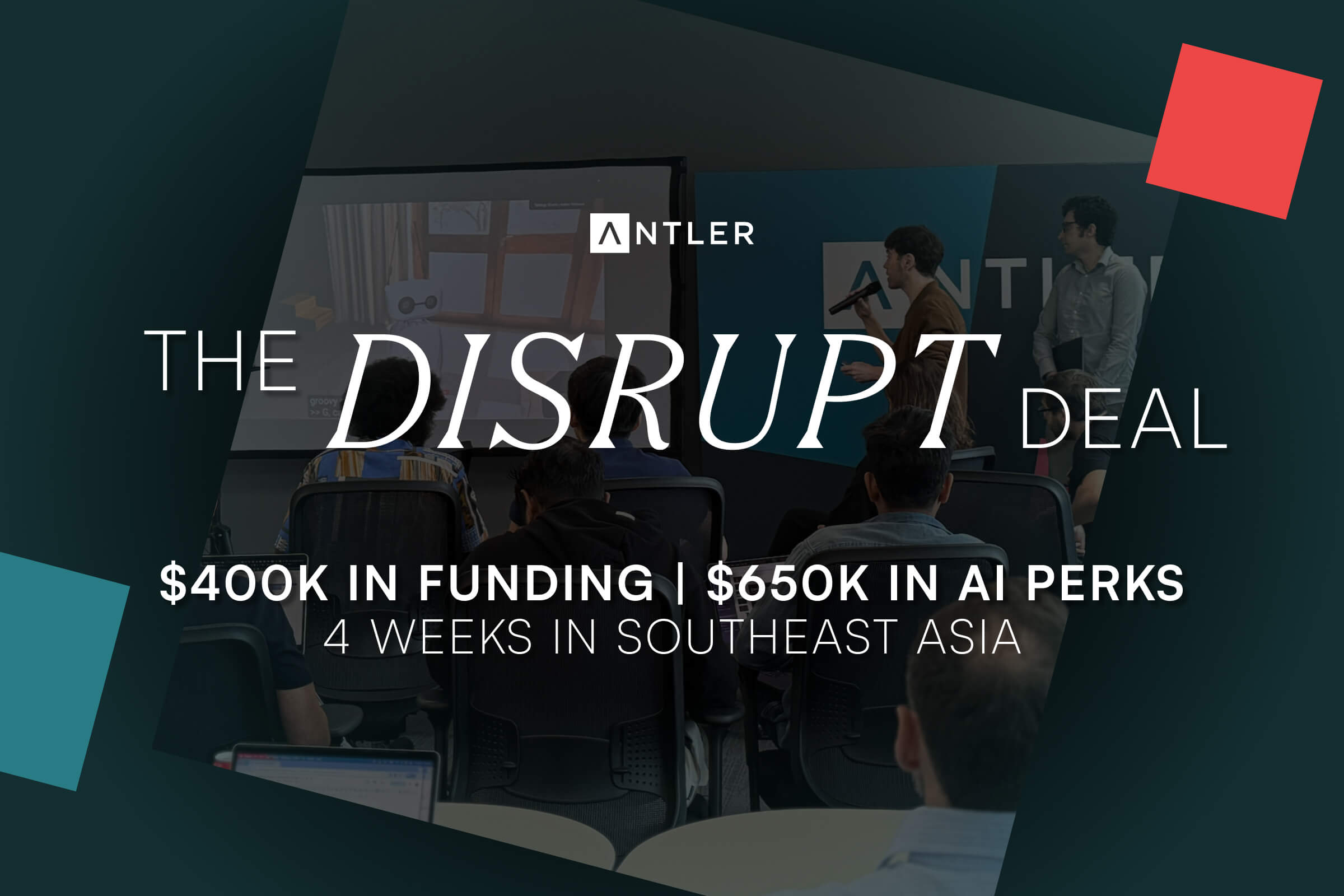This is part of Antler's "Finding the Upside" series, aimed at supporting and empowering the entrepreneurial community during the Covid-19 pandemic.

Earlier in the week, we published "Fundraising amid the Covid-19 outbreak - what you need to know," aimed at providing startups and founders with timely advice around raising capital during the coronavirus crisis.
In it, Anthony Millet, Partner of Antler, Australia and New Zealand, shared his fundraising fundamentals, as well as what founders should be considering with the added complexity of the Covid-19 outbreak.
With that in mind, it inspired us to look beyond our own sources of advice, and seek out that of some of the experienced and successful angel investors in our network.
Here's what 12 Australian angel investors are thinking about right now in relation to investing in startups amid the Covid-19 outbreak.
Wilson Casado

I believe early-stage investors are mostly optimistic, and we have seen great new companies surging during previous crises. These times, however, are unprecedented. We will need to learn together how early-stage capital flow will behave.
As an investor, I personally think that this is a great time to fund startups. These companies will allow "turning setbacks into springboards for opportunities", and this is worthy investing. The sector will also play a key role in creating new jobs, which will be critical in the recovery phase.
While I understand that many investors will find themselves severely impacted by the crisis, in a recent survey, Perth Angels' members revealed that they are very interested in the deal flow activities during this period. Most of our events planned for 2020, including Pitch Nights, are going ahead in the virtual format, as we all get familiar with this new way.
Paul Greenberg

"Disruption and opportunity go hand in hand" might be a well worn term in the investor ecosystem, but I have always found it to be accurate. Whilst these are deeply painful times for so many, the nature of the free market (ok, capitalism), means that astute investors are searching for businesses, business models, and for those entrepreneurs who are looking through the dark clouds of times such as these, to find those silver linings.
In times of stability, the status quo rules, and clearly are by definition better for larger and established enterprises. In times such as these, opportunities open up for startups to find traction, where agility comes to the fore. As the saying goes, it's not the big eating the small, rather it's the fast eating the slow.
Without doubt COVID-19 has served to accelerate the inexorable trend to digitization. From video conferencing, to online shopping, people are optimizing the digital umbilical cord which binds people, businesses, societies and the world, together. Paradoxically there is also a return to local, providing both global and local niche opportunities.
Investors (myself included), are more active than ever in meeting with agile and nimble entrepreneurs who can see the opportunity. Many of these opportunities now seem to have a deep connection to purpose, not just profit, and the rise and rise of the circular economy movement is one such example, with sustainability at the core of this unstoppable momentum. Many people, and many investors will be deeply transformed by this moment in time when the vulnerability of the planet, and our humanity has been amplified. Business models that rise up to meet this new paradigm of thinking will not only prosper, but stand to change the world, for the better.
Jason Weeks

During this crisis there are three things that founders can do that will be of significant value both to their team and their startup.
That being said, nobody has a crystal ball and I wish founders the best of luck getting out the other side of this difficult time.
James Stewart

The current crisis has returned focus to growth through profitable sales. The economy clearly still has needs to be met and will pay to do so if you can deliver well. If your mindset is that you have an opportunity to profitably help others to solve their problems you will find ways to grow and succeed. Clients are taking a hard look at the cost base and the value they get from their spend (especially in light of drastically reduced budgets), so this could be your opportunity to get in front of them and help.
1. Don't panic
2. Minimise your burn rate as much as possible to buy time. Use that time to focus on profitable sales
3. Identify the people who are your allies, both professionally and personally. Stay in contact regularly and understand what you can do to help/support them (they may not be able to tell you directly, it may take time to emerge)
4. Be very clear what problem you solve for customers and why they pay you
5. Focus on how to explain the value creation you bring to clients
6. Find the people who are really struggling with the problem you are solving and pitch them
7. If there isn't enough cash flow in the current product/niche you'll need to adapt the product to be more valuable to clients or cost less to deliver. Remember not all value is from the direct use of the product, sometimes there are additional elements your company brings though they are not directly obvious (signalling affiliation to values, being part of a group, etc)
Claire Wivell Plater

One of the few certainties already apparent from this crisis is the acceleration of people's relationship with technology. Tech startups need to examine the implications of this for their product and service delivery, and consider which aspects of the business should remain the same, and which can be enhanced to meet consumer behaviours, public expectations, legal requirements, and operating models.
From a legal perspective, the temporary (six-month) expansion of the enforceability of electronic contracting and document execution has potential to endure beyond the crisis; being fully aligned with the Coalition's Red Tape Reduction agenda. Trouble-free operation in this area during the crisis may well give federal and state governments the confidence and impetus that is needed for permanent reform. Startups should be considering how to incorporate this into their tech build, to steal a UX march on their less nimble competitors who may struggle to respond quickly if and when the changes become permanent.
Rob Lederer

Rob Lederer
Right now, given the likelihood that several early stage companies won't make it through the turmoil, I think it's more important to focus on the companies you're already invested in. Your time and money is best spent on determining if you can help them and how so. I see this as being a smarter decision than trying to deploy new capital in an environment that's changing so much from day to day. It's harder than ever to gauge the likely success of a new business. There's really no need to rush into anything right now, momentum is not on your side after all.
Anthony Sochan

The advice we are giving startups and specifically founders right now is:
James Hutchin

Three things to think about in responding to a crisis. First, it's all about the people, and one needs to keep front of mind and demonstrate what I call the 4 C's:
The second thing one must do is adjust their leadership style, and even if not your usual mode, move to a "command and control" management approach. This is sustainable only for short bursts, but it oddly gives people comfort when still in the "shock and awe" stage of a crisis. By way of example, if told that there is a bomb in the building, one doesn't want to hear, "let's scrum our way towards a consensus about what to do next," one just simply wants to be told what to do. Expediency trumps process.
Third and finally, act fast. If you are looking to preserve cash, the steps you take, even the drastic one, have a significant lag time prior to showing any positive impact. Move quickly, or the odds favour the crisis outrunning you.
Will Lawson

For founders:
As investors:
Jonathan Herrman

While I am looking very nervously at other asset classes (including our super which is predominantly in shares and property funds), I have not 'shut shop' regarding startup/ VC investing.
Firstly, I had made pre-COVID commitments to VC which I will honour. Secondly, in a world where Zoom has greater market cap than United, Delta and American Air combined, new businesses and business models represent a lot of future value. Thirdly, as people are driven online, there are many cloud-based (can I still say SaaS?) services that can only benefit from this in the long-term. I have participated in a small way in one such business, while in iso! And fourthly, I remain grateful that we have enough food and ongoing revenue / reserves and even toilet paper that the first 3 reasons above can stand sustainably.
Stay safe!
Robert Nicholls

As an angel investor who has spent the past five years building a startup portfolio of technology enabled and highly scalable ventures, I have asked myself what the current crisis means for those founders who are early in their capital raising cycle and are dependent on angel funding to bring their MVP to market. The reality is, angel funding is going to be even harder to access in Australia. The community is small and continues to be concentrated into a limited number of verticals, dictated by where the angel's have assembled knowledge, expertise and success.
This financial crisis will see a lot of the Angel activity 'go to ground' as these individuals focus on assisting their existing portfolio companies, be it as advisors or as a first line of defence to support the capital top-ups needed to get through COVID-19. Some Angel's will also be forced to the sidelines as they deal with the consequences of the financial impairments to their own investment portfolios or the loss of income from their mature commercial ventures (which often generate the proceeds that are directed into their startup investment activities).
Quite simply, they will be unable (or unwilling) to participate because their own financial circumstances have changed. Recognising and acknowledging this reality does not mean however that founders should simply throw in the towel. It simply requires they be more diligent, focused, strategic and effective in their capital raising endeavours.
There is a very important distinction to make and recognise within the changed landscape of early-stage funding brought on by the crises. This is: Don't confuse the ability of early-stage financiers to participate in a funding round as the factor that determines whether a business is investible.
Ventures that were of the quality and character to be assessed as investable before the COVID-19 crises, should technically, continue to be of investment grade (within the context of the early stage investment criteria).
Founders must and should continue to be focused on the factors or principles that clearly demonstrate that their ventures continue to be investable. If they can meet the conditions of investment grade, the capital will find them through the ecosystem of the domestic venture capital network. For those early stage investors with capital to deploy (and there is cash on the sidelines ready) this period represents one of the best times to invest into quality startups. Primarily, this is because there has been a tectonic shift in the landscape for ventures to be able to penetrate into a marketplace which is now open to transformation and adopting new services, products, operating protocols and business models. What investors are looking for (which has not changed) is who are the ventures with the capacity and the capability to thrive in this new world order.
When assessing the investability of startups, investors will use a range of different criteria and evaluation techniques. For me the test of investability is based on 6 key principles, which every startup must meet in order for me to ultimately take a position on their cap table. These principles are:
1. Team: Seek the exceptional (this might be operator experience, unique insights, previous performance etc.)
2. TAM (attractive): With trajectory supported by verifiable SOM > SAM.
3. Technology: Demonstrated Product Market Fit (but often at the angel round the investor taking a punt on the Team's unique insights and ability to conjure and develop a product that fits).
4. Traction: Are the dogs eating the dog food (or is there a clear pack of hungry eaters gathering to begin a frenzy of eating!)
5. Timing & trend: Is it the right time, place and thematic to deliver success?
6. Terms: Appropriate, attractive, fair.
Each principle cannot operate in isolation but must come together to mesh the principle portfolio together. There must be synergy and alignment.
Even in these unprecedented and difficult times thrust upon us by the COVID-19 pandemic, founders should focus on those factors that they continue to have influence and some control over. By recognising and understanding that investors employ principles to guide them in their decision-making to invest or pass on a round of capital raising, and align to these principles, founders will put their ventures in the best position to receive capital that is ready and waiting to be deployed.
Brendan Hill

My advice to startups right now is to operate like a cockroach. The startups that can cut their burn rate, continue to organically grow and survive to the other side of COVID-19 will win. VC's are now looking for two different plans: A COVID-19 "cockroach" plan and a "good times" growth plan.
They are also looking for 18-24 months of runway, which is difficult for most high-growth startups. Some ways I have seen founders increase their runway is by taking a pay cut, implementing a hiring freeze, trimming staff, working from home to save on rent and even cancelling that Spotify premium subscription (after losing staff, this one hurts the most).
Another piece of advice, by just getting on the phone and negotiating hard with all existing suppliers, I've seen a founder cut their burn rate by 64%. Most suppliers are hurting as much as you, understand the difficult situation you're in and will look to help out.
These views are that of the named investors. They do not represent the official views of Antler.
This article was written by Sarah Kimmorley, Director of Communications for Antler, Australia and New Zealand.












